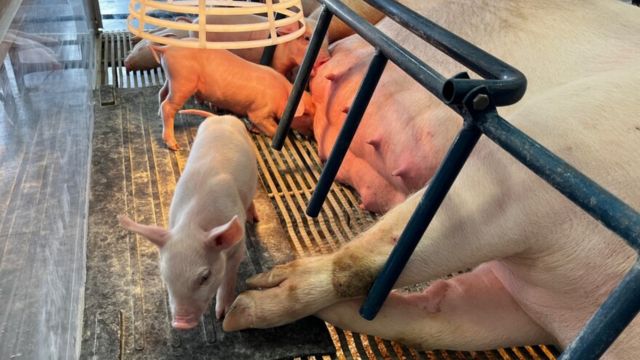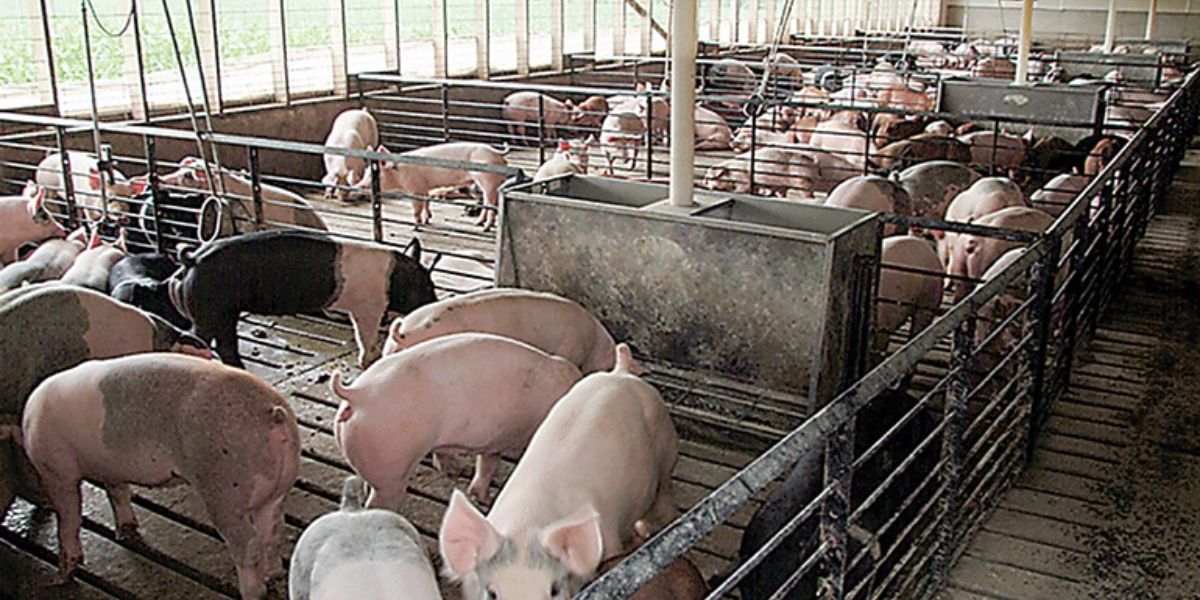110,000 piglets could starve, according to a lender to an Iowa ag corporation that is allegedly involved in a billion-dollar check-kiting operation. Scott Olson/Getty Images photo.
A lender is suing an Iowa ag corporation that is accused of running a billion-dollar check-kiting scheme, claiming that 110,000 piglets are in danger of hunger.
Sunterra Farms Iowa Inc., Sunwold Farms Inc., and Lariagra Farms South Inc. are being sued in U.S. District Court by Compeer Financial of Minnesota.
According to Compeer, the three defendants have given Compeer, their lender, sole security over their combined assets and run sizable swine operations in South Dakota and Iowa.
In order to safeguard its collateral by continuing to feed and care for 110,000 head of pigs, Compeer is requesting that the court choose a receiver to assume control of the defendants’ assets.
The Price family of South Dakota, consisting of Ray, Art, and Glen Price, is accused of running the defendant businesses. They own and care for 110,000 pigs in 54 barns in and around Yankton County, South Dakota.
The pigs, which belong to either Sunterra or Lariagra and are at different phases of development, are part of the 500,000 hogs that Sunterra manages.
Compeer asserts in the lawsuit that the defendant corporations cannot be trusted to run their businesses and safeguard their assets, including the 110,000 head of pigs in Yankton County, due to what it refers to as “the long-running fraud” that they have committed.
The three defendant businesses are accused of check kiting, a fraudulent technique in which a business takes checks from one bank account and deposits them in another that it controls, even though neither account has enough money to cover the checks.
By exploiting the delays in bank-to-bank check processing, the procedure enables one account to continuously display credits for uncollected monies.
According to Compeer’s lawsuit, earlier this year the defendant corporations were sending each other a lot of checks in almost the same amounts every day.
Some of the checks were between $800,000 and $990,000, which is just below the amount that would draw regulators’ attention.
According to the lawsuit, the transactions had the effect of producing falsely positive account balances, which led Compeer to pay interest to the company.
Compeer claims that it received a batch of checks totaling $9 million drawn from one of the defendants’ Canadian bank accounts on February 12, 2025, the day after questioning Ray Price, the CEO of the defendant firms, about the activities.

The cheques were intended to be deposited into the defendants’ Compeer account.
Ray Price later confirmed that the checks were simply meant to keep the Compeer account from going overdrawn, according to the lawsuit, and that if Compeer tried to deposit the $9 million, it would cause a matching overdraft in the Canadian account.
Price acknowledged that what the corporations were doing was “wrong,” according to the lawsuit.
According to the lawsuit, Price told Compeer staff that the Canadian account was overdrawn by about $21 million about 24 hours later.
He also requested that Compeer “send the money back” to the Canadian bank right away in order to pay off the overdraft. Compeer declined.
The lawsuit claims that Compeer discovered in late February that the Canadian bank had denied 65 cheques totaling $59.9 million that Compeer had previously credited to the defendants’ accounts.
The defendants’ $21 million positive cash balance at Compeer was thus immediately erased, and in its stead, a $36 million debt due to Compeer was incurred.
Compeer claims in its lawsuit that the check-kiting operation involved “billions of dollars” in fraudulent transactions prior to its collapse.
According to court documents, the Canadian bank requested the appointment of a receiver to manage the defendants’ assets on March 17, 2025.
However, the 110,000 pigs in Yankton County and the 370,000 pigs owned by third parties and run by Sunterra were not included in the assets cited in that case.
Compeer claims in court documents that it has been providing the money required for the upkeep and feeding of the Yankton County pigs for a number of weeks, but that it is no longer prepared to do so “while the parties who perpetrated this fraudulent scheme” continue to control Sunterra, Sunwold, and Lariagra.
Compeer claims in its court filings that it will advance the funds required to safeguard its collateral and keep the animals from starving if the court designates a receiver.
This information has been sourced from minnesotareformer.







Leave a Comment